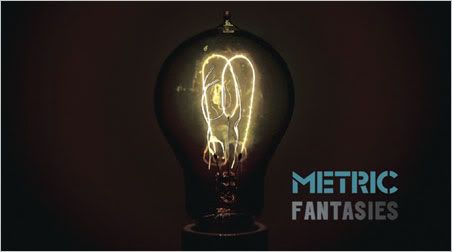
“Help I’m Alive”
from the album Fantasies
2009
iTunes
Unless you live in Canada and have had the pleasure of attending some of their frequent live shows, chances are it has been a while since you’ve heard from Metric. Their last album, 2005’s Live It Out (assuming you don’t count the 2007 long-delayed release of their previously unreleased/scrapped debut Grow Up and Blow Away — which I do not), was a dense, moody exercise in post-rock subtleties partnered with melodic pop declarations. A natural departure from that album’s predecessor (Old World Underground, Where Are You Now?), it remains a watershed moment for a band that loves to play with expectations as much as it strives to exceed them.
Born to be a front woman, Emily Haines (who also moonlights as a charter member of the original Canadian all-stars Broken Social Scene) brings a sinister sexuality to Metric that is at once confident, whimsical, and potentially devastating. If her playful harmonies aren’t offsetting her stark posturing, then her stark posturing is offsetting her playful harmonies. Her 2006 solo debut as Emily Haines & the Soft Skeleton, Knives Don’t Have Your Back, built upon that foundation with a lively and engaging personal testament of both malaise and genuine honesty.
Now, Metric have returned from a brief hiatus with Fantasies. Half an art-rock opus, half a post-pop frolic, Fantasies finds Metric and their illustrious front woman at a pivotal moment in their career. “If I stumble / They’re gonna eat me alive,” Haines confesses on album opener “Help, I’m Alive.“ The LP follows suit with this type of self-effacing frankness, but goes a long way in not abandoning its more labored pathos.
Probably the most personal album in Metric’s catalogue, Fantasies takes on the more virulent but worthwhile dangers apparent within the act of actually aspiring towards something grand. As per usual, danceable downbeats and digitized dance-punk riffing play out underneath a silky but precocious vocal, and you’ve got the makings of a good Metric record. However, on Fantasies, they use these familiar elements to tell a unique, and more intimate story than usual. It’s not that Metric have not been personal before, but there is a level of vulnerability without even the appearance of weakness that’s reached on Fantasies which is ultimately compelling, if not slightly off-putting.
It’s a little unfortunate that the sonic assault present on previous Metric albums (and the first third of Fantasies) couldn’t have been used more to its advantage. The quiet back portion of Fantasies, in particular, is poorly integrated with the rest of the album. Songs like “Collect Call,” “Front Row,” and ‘Blindness” are actually fine, fine tracks. But their placement on the album speaks less to a subtle, deconstructed ending, as much as they do to running out of gas; which is a shame, because this LP is beautifully conceptualized, but, if it has a fault, it’s that it is slightly underwhelming in its presentation. If you were to listen to Live It Out and Fantasies back-to-back, you’ll find that the latter does have a particularly reigned in feel to it, and, perhaps, a more lenient mindset when it comes to letting pop melodies prevail over the steely rawness that can sometimes come out when Metric really decide to show their teeth.
Nit picks aside, however, Fantasies finds Metric displaying a progression and maturity that comes as easy to them as swagger and general smarminess comes to most groups in their position. It’s not an out and out masterwork — the more you listen, the more you spot some of the weaker portions and broad miscalculations—but it may be as close as Metric have come to such a thing. We may be only one album away from Metric finally finding that old world underground, and making it their own.


